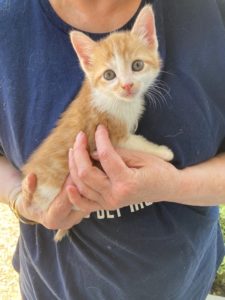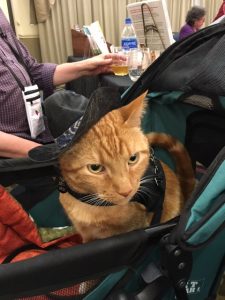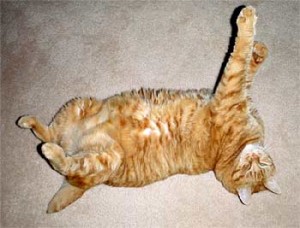 Do you have a marmalade cat—an orange tabby? I had one once many years ago, and I’ve known several. Most of them were sweet cats, except for one that crossed my path a few years ago. His name was Rocket. Was he
Do you have a marmalade cat—an orange tabby? I had one once many years ago, and I’ve known several. Most of them were sweet cats, except for one that crossed my path a few years ago. His name was Rocket. Was he  ever a bad boy. They say that the orange male is larger than other male cats and the orange female is smaller than typical. Well, Rocket was a petite marmalade male—
ever a bad boy. They say that the orange male is larger than other male cats and the orange female is smaller than typical. Well, Rocket was a petite marmalade male— and he was ornery and downright mean. “Pet me,” he’d say, displaying a friendly demeanor. Then he’d attack viciously when you’d attempt to touch him. He broke into a neighbor’s
and he was ornery and downright mean. “Pet me,” he’d say, displaying a friendly demeanor. Then he’d attack viciously when you’d attempt to touch him. He broke into a neighbor’s  windows and assaulted the oldest, weakest cat inside
windows and assaulted the oldest, weakest cat inside  the house. He was awful and we were glad to see him leave the neighborhood when his family moved.
the house. He was awful and we were glad to see him leave the neighborhood when his family moved.
There’s an interesting study on orange cats that I thought you might like to read. The link follows. The findings include the belief that orange cats, for the most part, are friendlier and more affectionate than most. Have you found this to be true? Orange cats are more apt to display risky behavior. That’s an interesting concept. Most orange cats are males. And I thought this was interesting: orange cats have greater reproductive success in rural, unpopulated areas. Does that have something to do with the fact that they are so kickback and don’t thrive in a busy city? Here’s the site.
that I thought you might like to read. The link follows. The findings include the belief that orange cats, for the most part, are friendlier and more affectionate than most. Have you found this to be true? Orange cats are more apt to display risky behavior. That’s an interesting concept. Most orange cats are males. And I thought this was interesting: orange cats have greater reproductive success in rural, unpopulated areas. Does that have something to do with the fact that they are so kickback and don’t thrive in a busy city? Here’s the site.






As I read this I have an orange female on my lap. She is not small, weighing in at 12 -13 pounds. She is also large framed—a lap full. I have also had a male orange kitty. They both had/have large purrsonalities. I think my female is more aggressive than my male was. It’s interesting about personality traits being linked to fur color traits. I wonder if that’s true in humans too perhaps personality traits being linked to something else e.g. “the short man syndrome “?
Interesting. Boy she’s a big girl. Yes, I guess there are exceptions to all rules–even scientific ones. Enjoy your marmalade kitties.
Patricia